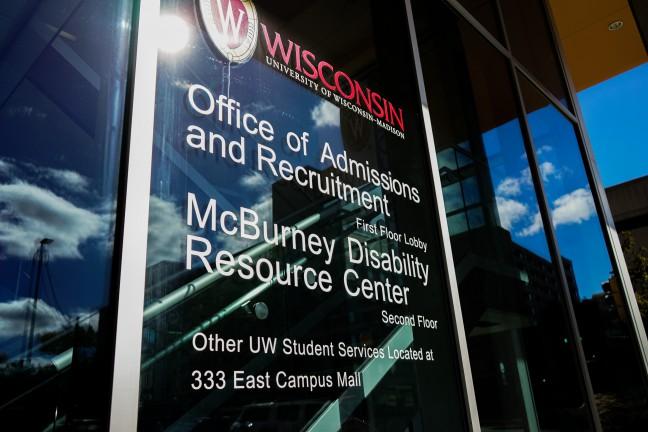The University of Wisconsin was recently named the fourth-best university for disabled students, according to a report from Neurodivergent-U. UW is the only campus from the rankings offering peer counseling services, mutual aid and a Disability Cultural Center, according to the report.
The report sought to identify barriers and discrimination students with disabilities face on college campuses. As such, Neurodivergent-U surveyed top public and private universities and used publicly available data to examine the experiences of students with disabilities on college campuses, the report said.
The final sample for the report included responses from 238 individuals at 65 universities, 44 of which were public, according to the report.
The report’s author, Bowen Cho, analyzed four pillars of data and information — support and accessibility, inclusion, safety, and critical pedagogy. The report uses direct quotes from students along with public data to prescribe a score indicative of if universities exemplify each of the four pillars, according to the report. The maximum score for each pillar was 100.
Support and accessibility examines how many counselors are offered per 1,000 students. Currently, UW has two counselors on staff per 1,000 students, and the average wait time for counseling appointments is more than two weeks, according to Neurodivergent-U.
Student quotes indicated to Neurodivergent-U that UW provides remote alternatives for lectures, but not all campus buildings, such as residence halls, are accessible to students with disabilities. UW scored a 23.33 on the support and accessibility pillar, according to the report.
Inclusion focuses on diversity, equity and inclusion training on campuses as well as peer support programs. UW offers disability and ableism training for faculty and staff, but training is not mandatory, according to data from Neurodivergent-U.
Additionally, UW has multiple established peer support programs — the DCC, the Teaching Assistants’ Association and Badger Support Network. UW scored a 50 on the inclusion pillar, according to the report.
Pillar three looks at safety on campuses, including discrimination or harassment experienced by students, police involvement in mental health crises and the use of reporting systems.
Students at UW reported experiencing ableism, discrimination or stigmatizing language, according to data from Neurodivergent-U.
Data from the report also shows police are involved in responding to mental health crises at UW, which the report said can have isolating effects. UW scored a zero on the safety pillar, according to the report.
Critical pedagogy investigates which universities encourage critical thinking on issues such as power, capitalism and race. Cho used survey responses and online resources to learn if universities offer support for racial justice, disability studies, critical theory and ethical research. UW scored 56.25 on the critical pedagogy pillar.
New sustainability center to be built at entrance of Lakeshore Nature Preserve
There is a need for more support for the disability community on campuses, despite progress, according to the report.
“Though this and other recent analyses suggest that issues of accessibility and inclusion in higher education are finally receiving overdue attention, this analysis suggests many areas for improvement,” the report said.
Additionally, there is a common misconception that students with disabilities do not belong in academia, despite prestigious universities providing the most support for students with disabilities, according to the report.
There is a long way to go to ensure students with disabilities feel included on the university, DCC Director Helen Rottier said.
“Having the high-ranking schools identifying policies and practices at those schools serves as a model for the small steps we can take to continue to move forward,” Rottier said.
McBurney Disability Resource Center access consultant Heather Stelljes said surveys, such as the one by Neurodivergent-U, provide UW with an opportunity to learn about students’ experiences and examine what should be done to support disabled students moving forward.
Stelljes said UW has been working to build a community for students with disabilities through campus resources such as the McBurney Resource Center and the DCC, which were highlighted in the report.
“We very much see ourselves as a point of access, but I also recognize that sometimes we’re viewed as somewhat of authority figures, so people might not always give us feedback about their experiences,” Stelljes said. “So this is a great opportunity for us to hear directly from disabled students about their experiences.”
The DCC works to provide students the resources to appreciate disability culture and support students exploring their relationship with a disability, according to the DCC website. The DCC is open to students of all backgrounds, even if they have not disclosed their disability.
State legislature passes bill ensuring top 5% of high schoolers admitted to UW-Madison
Ensuring injustices at universities are visible through resources like the Neurodivergent-U report and DCC can lead to a reconceptualization of university spaces and services, UW professor of rehabilitation psychology and special education Aydin Bal said.
“Once we have these cultural centers and once we have voices, experiences, activities, desires and struggles, it gives us another opportunity to reconceptualize what we are teaching, how we are teaching, how we are organizing our buildings,” Bal said.
The DCC and McBurney Center work to educate everyone on campus through presentations, education and outreach, Rottier said. The goal of this education is to model what inclusivity for people with disabilities should look like at the university level, Rottier said.
Disabilities can present themselves in different ways and are not always visual, Rottier said.
“We need to recognize that people with disabilities are all around us and you cannot tell from looking at someone whether they’re disabled, and you cannot tell from knowing someone’s diagnosis, what the impact on their life is,” Rottier said.


















